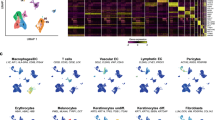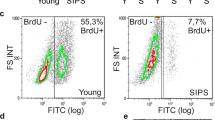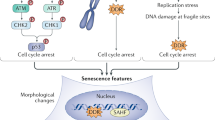Abstract
HUMAN diploid fibroblasts cannot be propogated indefinitely in culture1. Longevity experiments with fibroblasts grown from skin biopsies from individuals of different age show that the greater the age of the donor, the shorter the life-span of their cells in culture2–4. Patients suffering from Werner's syndrome age prematurely and have an average lifespan of 46 yr (ref. 5). Martin, Epstein and Sprague4 established primary fibroblast cultures from skin specimens from four such patients and discovered that these could be subcultured only 4–11 times before growth ceased. This compares with an average lifespan of 32 subcultures for skin fibroblasts from normal individuals in the same decades of life4. We show here that changes which occur in the enzyme glucose-6-phosphate dehydrogenase (G6PD) during the senescence of normal fibroblasts6, also occur during the premature senescence of cells from a patient with Werner's syndrome.
This is a preview of subscription content, access via your institution
Access options
Subscribe to this journal
Receive 51 print issues and online access
$199.00 per year
only $3.90 per issue
Buy this article
- Purchase on Springer Link
- Instant access to full article PDF
Prices may be subject to local taxes which are calculated during checkout
Similar content being viewed by others
References
Hayflick, L., and Moorshead, P. S., Expl Cell Res., 25, 585 (1961).
Hayflick, L., Expl Cell Res., 37, 614 (1965).
Goldstein, S., Littlefield, J. W., and Soeldner, J. S., Proc. natn. Acad. Sci., U.S.A., 64, 155 (1969).
Martin, G., Sprague, C., and Epstein, C., Lab. Invest., 23, 86 (1970).
Epstein, C. J., Martin, G. M., Schultz, A. L., and Motulsky, A. G., Medicine (Baltimore), 45, 177 (1966).
Holliday, R., and Tarrant, G. M., Nature, 238, 26 (1972).
Gibbs, D. D., Proc. R. Soc. Med., 60, 135 (1967).
Holliday, R., Nature, 221, 1224 (1969).
Gershon, H., and Gershon, D., Nature, 227, 1214 (1970).
Lewis, C. M., and Holliday, R., Nature, 228, 877 (1970).
Lewis, C. M., and Tarrant, G. M., Nature, 239, 316 (1972).
Gershon, H., and Gershon, D., Proc. natn. Acad. Sci. U.S.A., 70, 909 (1973).
Gershon, H., and Gershon, D., Mech. Age. Dev., 2, 33 (1973).
Zeelon, P., Gershon, H., and Gershon, D., Biochemistry, N.Y. 12, 1743 (1973).
Orgel, L. E., Nature, 244, 441 (1973).
Orgel, L. E., Proc. natn. Acad. Sci. U.S.A. 49, 517 (1963).
Author information
Authors and Affiliations
Rights and permissions
About this article
Cite this article
HOLLIDAY, R., PORTERFIELD, J. & GIBBS, D. Premature ageing and occurrance of altered enzyme in Werner's syndrome fibroblasts. Nature 248, 762–763 (1974). https://doi.org/10.1038/248762a0
Received:
Issue Date:
DOI: https://doi.org/10.1038/248762a0
This article is cited by
-
Causes of Aging Are Likely to be Many: Robin Holliday and Changing Molecular Approaches to Cell Aging, 1963–1988
Journal of the History of Biology (2014)
-
Increased frequency of 6-thioguanine-resistant peripheral blood lymphocytes in Werner syndrome patients
Human Genetics (1990)
-
Elevated spontaneous mutation rate in SV40-transformed werner syndrome fibroblast cell lines
Somatic Cell and Molecular Genetics (1985)
Comments
By submitting a comment you agree to abide by our Terms and Community Guidelines. If you find something abusive or that does not comply with our terms or guidelines please flag it as inappropriate.



